Horse Problems: A Complete Guide
Hey there! If you own a horse or want to get one, you really need to know about horse problems. Horses are amazing animals, but taking care of them isn’t always easy. In this big guide, I’ll tell you about everything from common horse health issues to those tricky behavior problems you might run into.
Common Horse Health Issues: Is Your Horse Healthy?

Horses can get sick in many ways, and every horse owner should know about these horse problems. Finding these issues early and getting the right help quickly is super important for keeping your horse friend healthy and happy.
Hey there! Some links 🔗 on this page are affiliate links which means that, if you choose to make a purchase, I may earn a small commission at no extra cost to you. I greatly appreciate 🌼 your support.
Table of Contents
Colic: A Deadly Problem You Should Never Ignore
Colic is a one of the serious Horse problems that can actually kill your horse if you don’t act fast. It’s basically when your horse has really bad stomach pain from digestive troubles. Here’s what to look for if you think your horse might have colic:
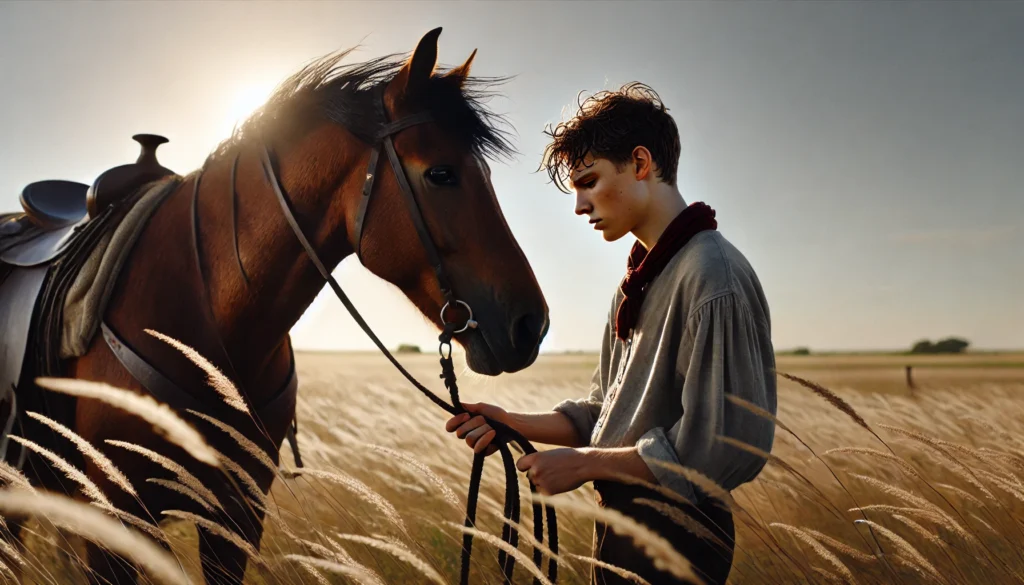
- Your horse keeps lying down, then standing up, over and over
- They roll around on the ground, sometimes looking really upset
- They keep looking back at their belly or even try to bite at it
- They don’t want to eat their food when normally they would
- You notice they’re not pooping much or at all
Colic is one of those horse problems that needs a vet right away. If you see these signs, don’t wait around hoping it will get better on its own. Many horses with colic can be saved if you get help quickly enough. Sometimes the vet might need to do special treatments or even surgery in really bad cases.
The scary thing about colic is that it can happen to any horse, even ones that seem really healthy. Things like changes in feed, not drinking enough water, eating sand, or even stress can cause it. That’s why good horse care with regular feeding times and clean water is so important for stopping horse colic before it starts.
How to Treat Horse Problems Like Colic: Take Action Immediately
If you see your horse has colic, you need to move fast – it’s a big deal! Here’s what you should do right away:
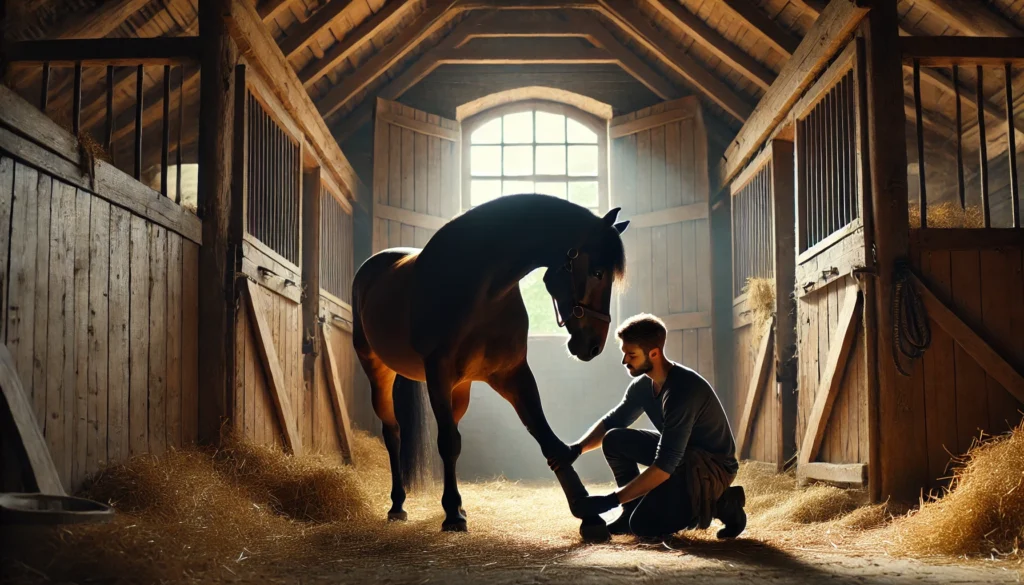
- Call your horse doctor now – this is too big for you to fix on your own.
- Keep your horse walking around – this helps keep stuff moving in their belly.
- Take away all food – don’t give them anything to munch on unless the horse doctor says it’s okay.
- Watch how they’re doing – feel if they’re hot, count how fast their heart beats, and watch how they breathe.
- Don’t let them roll on the ground – if they roll, their guts might get twisted up, and that’s really bad news.
The best way to handle horse problems like colic is to stop it before it starts. Feed your horse at the same times every day, make sure they always have clean water to drink, and get their teeth checked regularly. When you need to change what they eat, do it bit by bit, not all at once. And don’t forget to keep those nasty worms and bugs away with a good plan.
Remember, your horse can’t tell you when their tummy hurts, so you’ve got to watch them closely. If they seem off, aren’t eating, or keep looking at their belly, something might be wrong. A happy horse is one that doesn’t get sick in the first place, so taking good care of them every day is super important. Your four-legged friend counts on you to keep them healthy and comfortable!
Lameness in Horses: Identifying Movement Problems
Hey, so let’s talk about horse problems, specifically lameness. It’s basically when your horse can’t walk or run normally – you know, when something’s just “off” with their movement. Usually, it means they’re in pain, dealing with an injury, or have some structural issue going on.
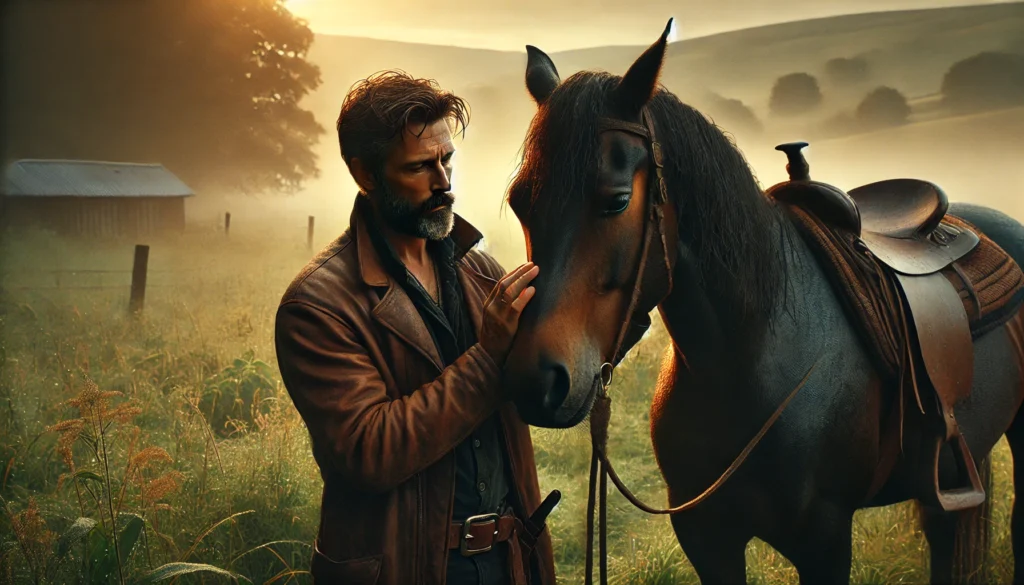
What causes this? Well, there’s a bunch of common horse problems that could be behind it:
- Hoof care for horses is crucial because hoof problems like abscesses or bruising are common culprits
- Joint inflammation or arthritis (poor things can get achy just like us!)
- Tendon or ligament injuries (think horse sports injuries)
- Fractures (which are obviously serious)
- Laminitis (a painful condition affecting the tissue in their hooves)
Want to spot lameness in horses? Just watch how they move. If you notice uneven steps, head bobbing when they walk, or them shifting weight off one leg, those are pretty clear signs of a sick horse. The treatment really depends on what’s causing it – could be as simple as rest or anti-inflammatories, or they might need physical therapy or even surgery in more serious cases.
To avoid horse behavior problems like this, regular vet check-ups, proper hoof care for horses, and good nutrition go a long way. And always adjust your horse training issues approach based on what your horse can physically handle. Trust me, this is essential horse maintenance guide info for anyone dealing with how to treat horse colic, lameness in horses, horse parasites and worms, or just looking for general horse care tips for beginners!
Horse Behavior Problems: Why is your horse upset?
Let’s talk about why horses act up sometimes. Your horse might be misbehaving because of their natural instincts, not enough training, pain in their body, or feeling stressed out. Here are some common problems you might run into and how to fix them:
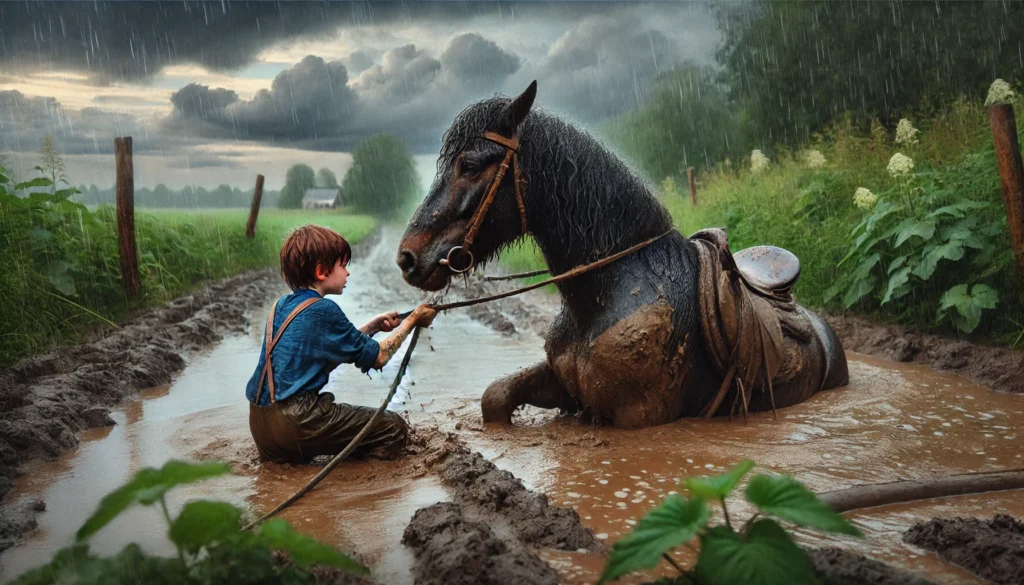
Bucking and Rearing
These are really dangerous habits that can get you hurt. Rearing is when your horse stands up on its back legs, and bucking is when they kick their back legs up in the air. These bad behaviors usually happen because of:
- A saddle that doesn’t fit right and hurts them
- Pain in their back muscles or spine
- Gaps in their training where they never learned better
- Being scared or worried about something
Solution: Don’t try to handle this alone! Get help from someone who trains horses for a living. Make sure all your riding gear fits your horse properly and doesn’t pinch or rub. Check that your horse isn’t hurting somewhere. Often, you need to go back to the beginning with training and slowly build up their skills again in a place where they feel safe and calm.
Biting and Kicking
When your horse tries to bite you or kick at you, they’re showing aggressive behavior. This usually happens because they’re afraid, trying to be the boss, or hurting somewhere.
Solution: Be very steady with how you train them – same rules every time. Reward them when they behave well. If your normally sweet horse suddenly starts biting or kicking, have a vet check them out because they might be in pain somewhere you can’t see. Make sure your horse understands your personal bubble and respects your space.
Horse Training Issues: Effective Techniques
If you’re having trouble with horse problems, especially if you’re new to owning horses, remember these important tips:
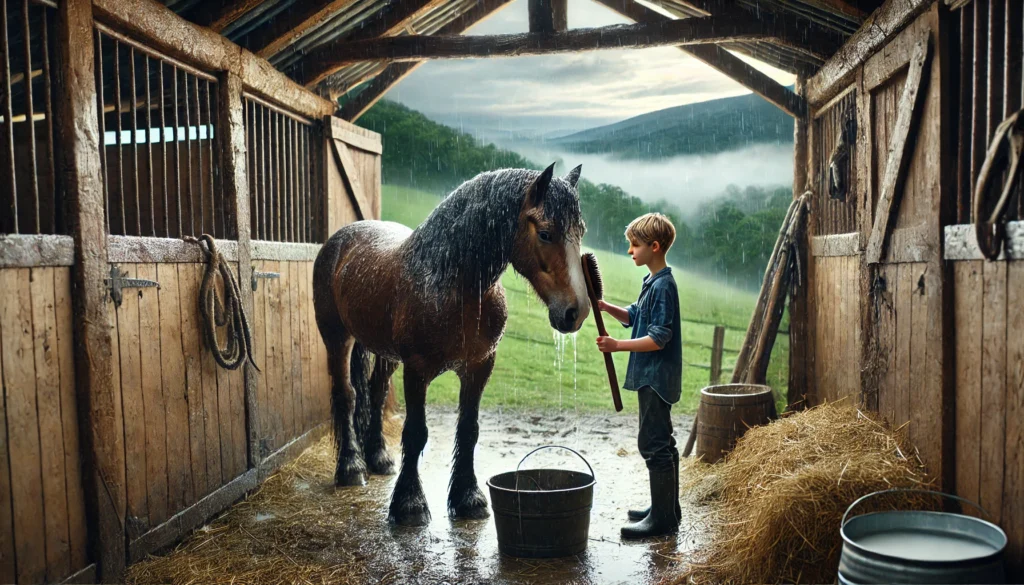
- Consistency: Use the same words, signals, and rules every single time you work with your horse so they don’t get confused
- Positive reinforcement: Make a big deal when your horse does something right – give treats, pets, or praise to help them understand what you want
- Short sessions: It’s much better to train for 15 minutes every day than to do one long two-hour session once a week – horses learn better with short, frequent lessons
- Patience: Building a good relationship with your horse takes lots of time – don’t rush it or expect too much too soon
- Professional help: Sometimes we all need help from someone with more experience – don’t be shy about asking a professional trainer for advice or lessons
Hoof Care for Horses: The Importance of Healthy Hooves
Horse people often say “no hoof, no horse” because it’s so true! If your horse’s feet aren’t healthy, nothing else matters because they won’t be able to walk, run, or even stand comfortably. Taking good care of their hooves is super important for their overall health.
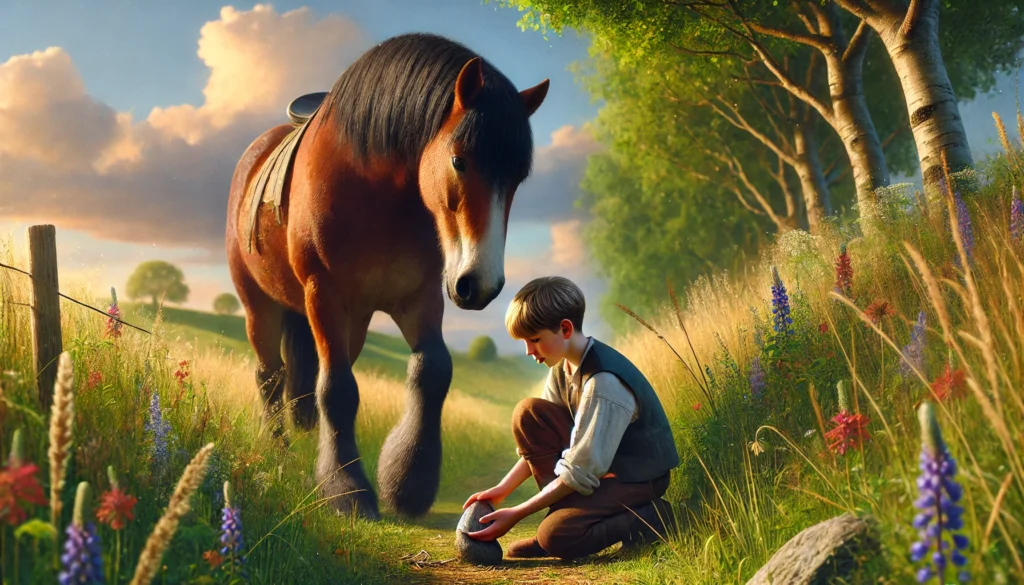
Basic Hoof Care Routine
- Regular cleaning: Use a hoof pick every single day to clean out dirt, rocks, and poop that gets packed in there
- Regular trimming: Have a professional farrier (horse foot expert) come out every 4-8 weeks to trim and shape the hooves properly
- Moisture balance: Hooves shouldn’t be too wet or too dry – both can cause problems
- Regular inspection: Look at your horse’s feet every day to check for cracks, bruises, or anything that looks different or weird
Common Hoof Problems
- Thrush: This is a stinky fungus infection that grows in the soft V-shaped part of the hoof (the frog)
- Abscess: A really painful infection that grows inside the hoof and makes your horse limp badly
- Quarter cracks: These are cracks that run up and down the side walls of the hoof
- Laminitis: This is very serious and extremely painful inflammation inside the hoof that can even be life-threatening
You can prevent most of these problems by feeding your horse good food, keeping their living area clean and dry, and having regular visits from your farrier and vet. If you notice anything strange about your horse’s feet – like limping, heat stress, or unusual shapes – call your farrier or vet right away. Don’t wait and hope it gets better on its own, because hoof problems usually just get worse without proper care.
Remember that taking care of horse hooves isn’t just about preventing problems – good hoof care helps your horse move better, feel more comfortable, and stay healthier overall. Your horse depends on you to notice when something’s not right with their feet since they can’t tell you in words when they’re hurting.
Horse Parasites and Worms: Silent Health Threats
Hey friend! Let’s talk about something really important that many people miss when taking care of their horses. Those sneaky parasites can really hurt your horse’s health without you even noticing it happening!

Internal Parasites
- Small strongyles: These tiny worms are the most common unwanted guests living inside your horse’s body. They hang out in the gut and can make your horse feel really bad over time.
- Roundworms: Baby horses and young ones get these a lot. They look like spaghetti (yuck!) and can cause big belly problems and slow growth.
- Tapeworms: These flat, ribbon-like worms can block things up in your horse’s insides and cause tummy troubles. Your horse might lose weight or have belly pain when these are around.
- Bots: These are actually baby flies (larvae) that make themselves at home in your horse’s stomach! They stick to the stomach walls and steal nutrients that should be going to your horse.
External Parasites
- Flies: More than just buzzing pests, flies make horses stamp, swish, and get super stressed. They bite, they spread germs, and they make your horse miserable in summer.
- Ticks: These tiny blood-drinkers latch onto your horse and feed for days! They can make your horse sick with weird diseases that are hard to spot until it’s a big problem.
- Mites: So small you can barely see them, but they make your horse itch like crazy! They dig into the skin and cause hair loss, scabs, and so much itching that horses hurt themselves from scratching.
Effective Parasite Control
Here’s how to keep these unwanted guests away from your four-legged friend:
Don’t just follow the same old deworming plan every month. Smart horse owners now check for eggs in poop first, then treat only when needed. This keeps the dewormers working well instead of creating super-strong worms that nothing can kill!
Ask your vet to check your horse’s poop for parasite eggs every few months. This tells you exactly what’s going on inside and if your plan is working.
Clean up poop from fields and paddocks at least twice a week. I know it’s a pain, but this breaks the life cycle of many parasites and keeps your fields cleaner and safer.
Fight flies with everything you’ve got! Put fly masks on your horses, spray safe bug spray made for horses, hang sticky fly traps, bring in helpful bugs that eat fly larvae, and keep the barn super clean. Flies hate clean places!
Understanding these horse care tips for beginners will save you from dealing with common horse health issues down the road. A little work now stops big problems later! Your horse will thank you by staying healthier, happier, and more playful for years to come.
Signs of a Sick Horse: Early Detection is Key
Horses try to hide when they’re sick, so you need to look for tiny hints that something’s wrong. Here’s what to keep an eye out for:
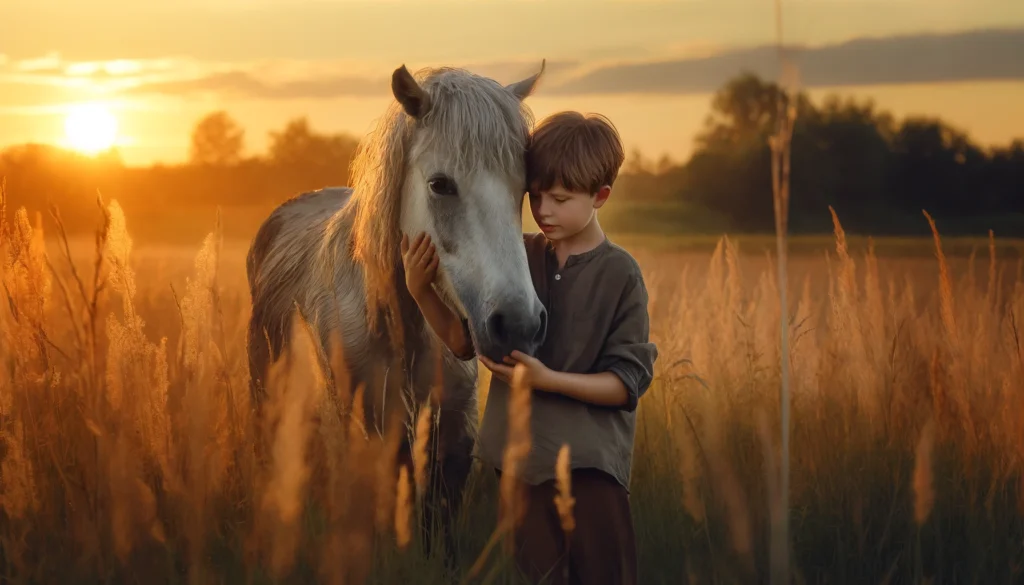
- Changes in behavior: Your horse seems sad, tired, or grumpy when they’re usually not.
- Not eating much: If your horse turns away from food they normally love, that’s a worry sign.
- Poop problems: Runny poop, no poop at all, or poop that looks strange in any way.
- Drinking changes: Either drinking tons of water or barely touching their water bucket.
- Off-normal body signs: Fever or chills (normal heat: 99-101.5°F), fast or slow heartbeat (normal: 28-44 beats each minute), or breathing funny (normal: 8-16 breaths each minute).
- Standing or moving oddly: Maybe they keep shifting from foot to foot, don’t want to walk, or stand in a weird way.
- Wet stuff coming out: Any goo or liquid from eyes, nose, or cuts that won’t heal.
- Puffy spots: Any part of your horse that looks bigger than usual or feels squishy.
Call your horse doctor right away if you see these things. Checking on your horse every day helps you learn what’s normal for them, so you can spot horse problems before they get really bad.
Horse Care Tips for Beginners: Starting Right
Just got your first horse? Here are some easy tips to help you take good care of your new friend:
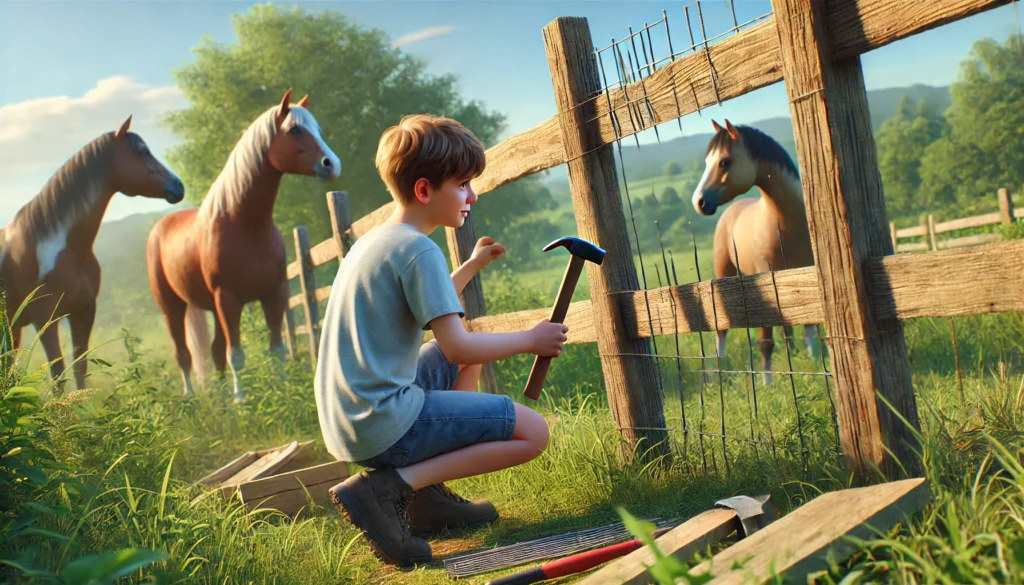
Daily Care Essentials
- Food and drink: Give your horse good hay, the right amount of grain for their size and work, and lots of clean, fresh water all the time.
- Safe place to rest: Make sure they have a dry, clean spot with good air flow to get out of bad weather.
- Brushing: Brush your horse every day to keep their skin healthy and to make friends with them. Horses love it when you find their itchy spots!
- Moving around: Make sure your horse gets to walk, run, and play enough each day to keep their body strong and their mind happy.
- Keeping watch: Look at your horse closely each day so you can catch common horse health issues before they turn into big problems.
Building Trust
Trust is the most important thing between you and your horse. Spend lots of time just being with them, don’t rush them to learn new things, and always handle them the same way so they know what to expect. Try to make each time you’re together fun and good, and slowly show them new things little by little so they don’t get scared. This helps prevent horse behavior problems down the road.
When your horse trusts you, everything else gets easier – from hoof care for horses to figuring out how to treat horse colic if it happens. Good trust means your horse will let you help them when they’re not feeling well, and they’ll try their best to understand what you’re asking when training gets tricky. Building this special bond takes time, but it’s worth every minute you put into it.
Horse Maintenance Guide: Long-Term Care
Taking care of horses year after year is hard work but worth it! Here’s what you should know about looking after your big four-legged friend:
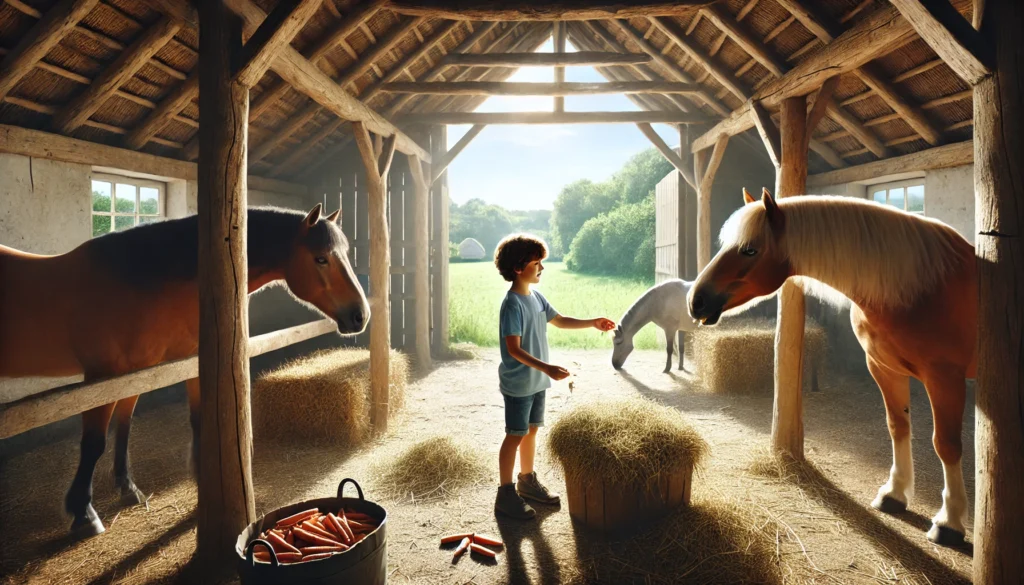
Seasonal Care Considerations
Summer
- Make sure your horse has shady spots and lots of fresh water – hot horses get sick fast!
- Fight those nasty flies that bite and bother your horse
- Keep an eye on how much water your horse drinks, especially after you ride them hard
Must-Have Summer Shelters for Horses!
| Feature | Specification |
|---|---|
| Brand Name | ShelterLogic |
| Item Height | 144 inches |
| Water Resistance Level | Waterproof |
| Ultraviolet Light Protection | UV Protection |
| Material Type | Polyethylene |
| Frame Material | Steel Frame |
| Item Dimensions L x W x H | 144″L x 144″W x 78″H |
| Item Weight | 120 Pounds |
| Customer Reviews | 4.1 out of 5 stars ⭐ (Not Fixed) |
Summer Must-Have: Auto Drinking Tank for Horses!
| Feature | Specification |
|---|---|
| Brand Name | Little Giant |
| Target Species | Horse |
| Item Dimensions L x W x H | 17.5″L x 14.25″W x 10.75″H |
| Capacity | 4 Gallons |
| Material Type | Metal |
| Customer Reviews | 5.0 out of 5 stars ⭐ (Not Fixed) |
Winter
- Feed your horse extra food when it’s cold – they burn more energy just staying warm
- Put cozy blankets on your horse if they shiver or seem cold
- Break ice in water buckets many times a day – horses need to drink!
Winter Must-Have: Cozy Fleece for Horses!
| Feature | Specification |
|---|---|
| Brand Name | Horseware |
| Target Species | Horse |
| Item Weight | 3.5 Pounds |
| Fabric Type | Fleece |
| Special Feature | Cooling, Padded |
| Customer Reviews | 5.0 out of 5 stars ⭐ (Not Fixed) |
Preventive Health Care
- Don’t forget yearly shots to keep your horse from getting sick
- Let the horse dentist check those big teeth every 6-12 months
- Give worm medicine on schedule to fight horse parasites and worms
- Visit the vet once a year to catch common horse health issues early
Nutrition Management
What your horse eats makes all the difference in how they feel and act. Give different food based on if they’re young or old, working hard or just hanging out, and watch for any horse behavior problems that might come from wrong foods. Don’t switch foods too fast – horse tummies are sensitive! Try to feed at the same times every day so they know when to expect dinner.
Expert Tips: Learn from Experience
I’ve spent many years around horses and talked to old-timers who’ve seen it all. Here’s what real horse people want you to know:
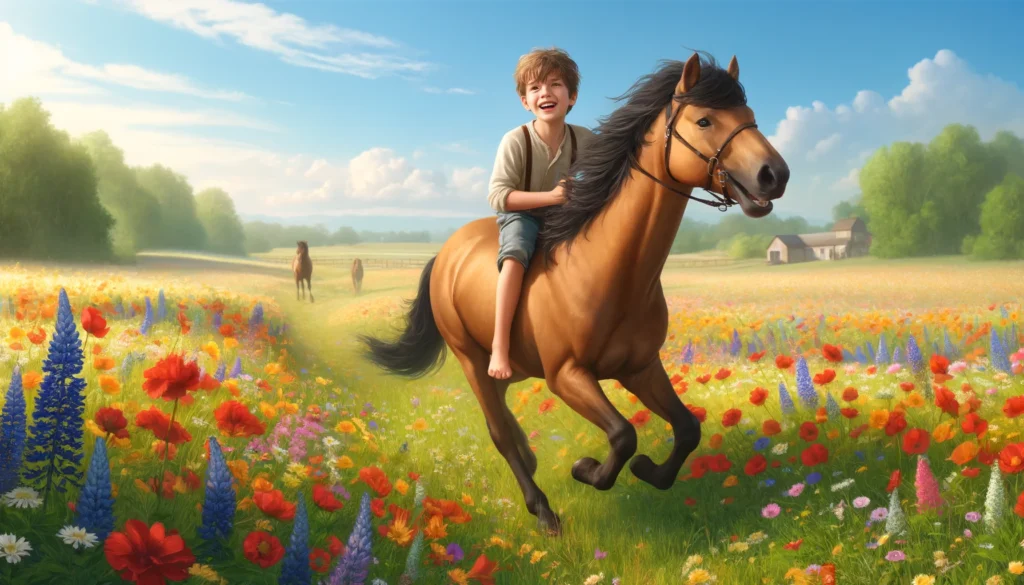
- Watch how your horse walks every day to spot lameness in horses before it gets bad
- Learn the signs of a sick horse like not eating, sad eyes, or standing funny
- Good hoof care for horses saves you big trouble later – pick those feet daily!
- If you’re just starting out, read all the horse care tips for beginners you can find
- Know how to treat horse colic fast – call the vet right away if your horse rolls and looks at their belly
- Fix little horse training issues now before they turn into big scary problems
- Keep a notebook about your horse – write down what works and what doesn’t
- Make friends with the other folks at your barn – they’ll help when you’re stuck
- Spend quiet time just hanging out with your horse – they remember who’s kind to them
- Trust what your heart tells you about your horse – sometimes you just know when something’s wrong
Your horse counts on you every single day. They can’t open the gate or fill their water bucket! When you take good care of them, they’ll be your buddy for many happy years. That’s what the horse maintenance guide is all about – keeping your big friend healthy and happy!
Getting to Know Your Horse Buddy
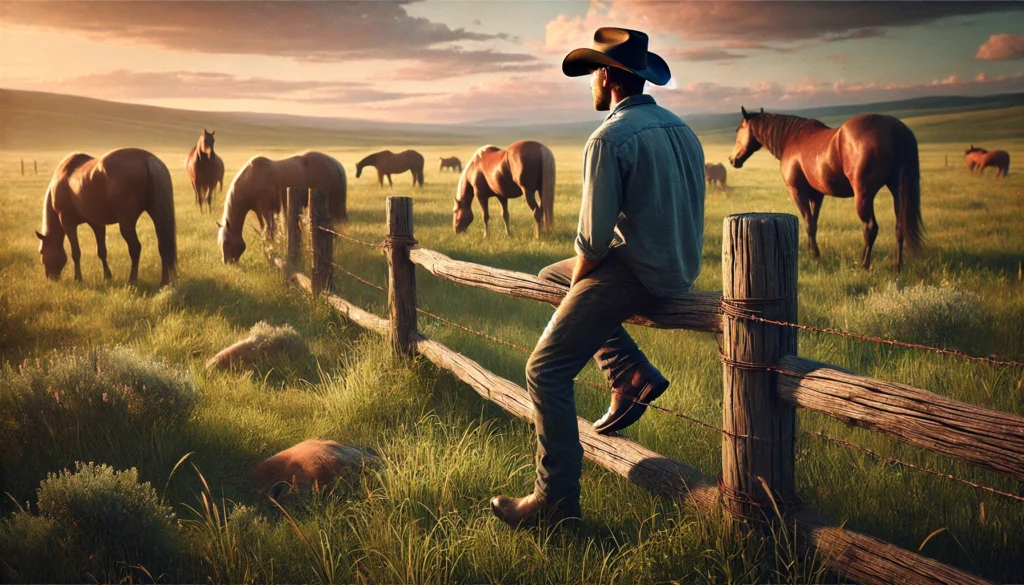
Learn horse behavior: Horses talk to us without using words! When you learn what their ear flicks, tail swishes, and body moves mean, you’ll spot horse problems way before they get bad.
Build a support network: You need good horse people around you! Find a vet you really like, a foot expert who does great work, a trainer who matches how you learn, and some older horse owners who won’t mind when you text them at midnight freaking out about something weird your horse did.
Continue education: Horse stuff keeps changing! What folks said about horse care tips for beginners even a few years back might not be the best way now. Keep reading, watching videos, and talking to other horse people.
Document everything: I know it feels like work, but write down when your horse gets shots, what you feed them, when you change their food, and any odd things you see. Later when you’re trying to figure out why your horse has a tummy ache or seems off, these notes will be super helpful to spot patterns in common horse health issues.
Trust your gut: If something about your horse feels wrong to you, it probably is. Don’t wait! It’s always better to call for help and find out it was nothing than to miss signs of a sick horse and wait too long.
Conclusion: A Rewarding Journey

Having a horse can be tough sometimes (like those scary middle-of-the-night horse colic moments!), but it’s also one of the most amazing things you’ll ever do. When you get your horse checked by the vet often, feed them good food, make sure they get enough play time and exercise, and work with them regularly, you can stop most horse behavior problems before they even start.
Always keep in mind that each horse is different, just like people! When you really pay attention and get to know what makes your horse happy, sad, or worried, you’ll build this amazing friendship that’s hard to describe to non-horse people. Understanding their special needs, like how often they need hoof care for horses or noticing when they start to show tiny signs of lameness in horses, helps this bond grow stronger every day.
Keeping an eye out for horse parasites and worms, never missing vet visits, and just watching your horse closely each day helps them stay happy for many, many years. And when horse training issues pop up (and they will!), catching them quick makes fixing them so much easier.
All those hours you spend reading horse maintenance guides, watching training videos, and asking questions might seem like a lot of work. But the moment your horse sees you and comes running across the field, nickering and happy to see you – that’s when you know every second was worth it.
That special bond is what makes all the hard work, dirty clothes, and early mornings worth it. The time you put in comes back to you as a friend who trusts you completely. Happy riding, and enjoy every minute with your four-legged buddy!
FAQs related to horse problems
Q1: Why is my horse not eating?
So look, if your horse is turning up its nose at mealtime, don’t just brush it off! This could be your buddy signaling something’s wrong – maybe colic, tooth troubles, or even a fever brewing. Better get a vet to check them out ASAP. With horse health issues, it’s always better to act quickly!
Q2: How to care for a horse’s hooves?
Taking care of those hooves is super important, yaar! Make hoof picking part of your daily routine, and don’t skip those professional trimmings every 4-8 weeks. Keep an eye out for any cracks or weird stuff going on down there. Proper hoof care for horses prevents so many headaches later!
Q3: Why is my horse bucking?
Oh man, the bucking situation! Usually it’s your horse saying something’s not right – could be the saddle’s pinching, they’ve got some back pain, or there’s a gap in their training. Double-check all your gear and maybe bring in a trainer who knows their stuff about horse behavior problems. Your horse isn’t being difficult just to annoy you!
Q4: What are the symptoms of worms in a horse?
Horse parasites and worms are nasty business! Watch for weight dropping even when they’re eating normally, a coat that’s lost its shine, performance taking a dive, colic symptoms, or runny poop. Stick to a regular deworming schedule – it’s seriously one of those horse maintenance guide basics you can’t skip!
Q5: How to train a new horse?
If you’re dealing with horse training issues as a newbie, remember these horse care tips for beginners: keep your training sessions short and sweet (horses get bored too!), reward the good stuff, be super consistent with your signals, and pack your patience! Focus on building that trust bond first, then slowly introduce new things. Rome wasn’t built in a day, and neither is a well-trained horse!

